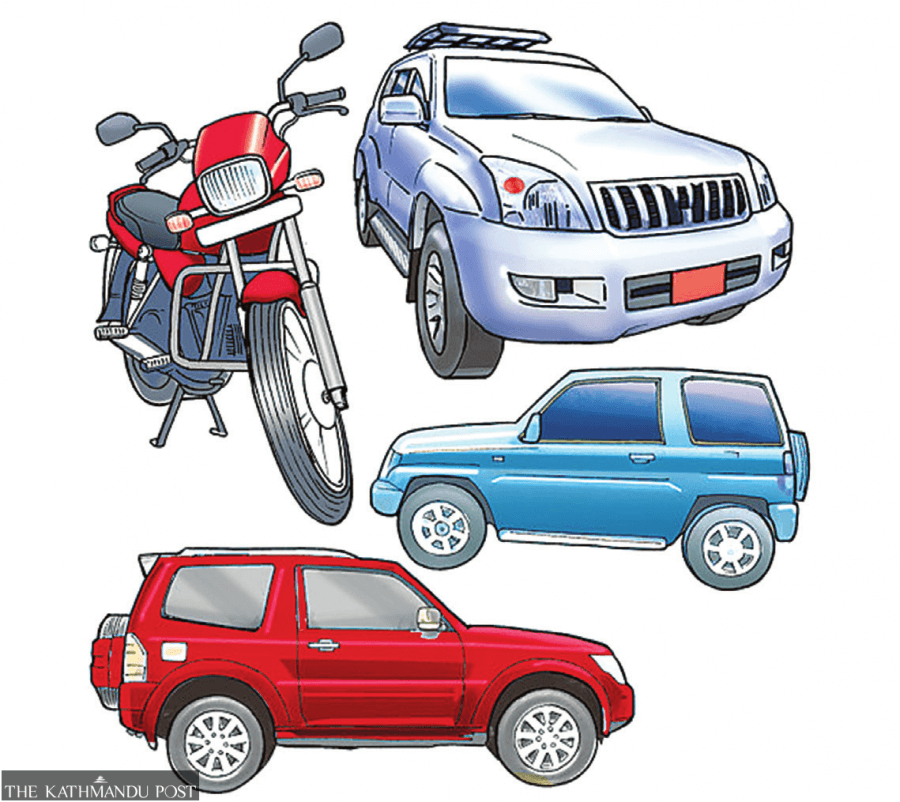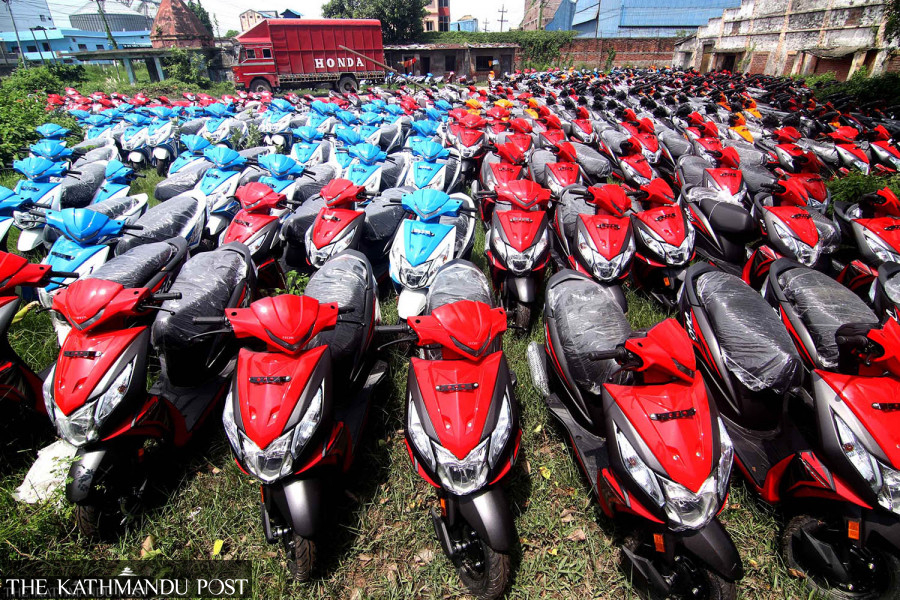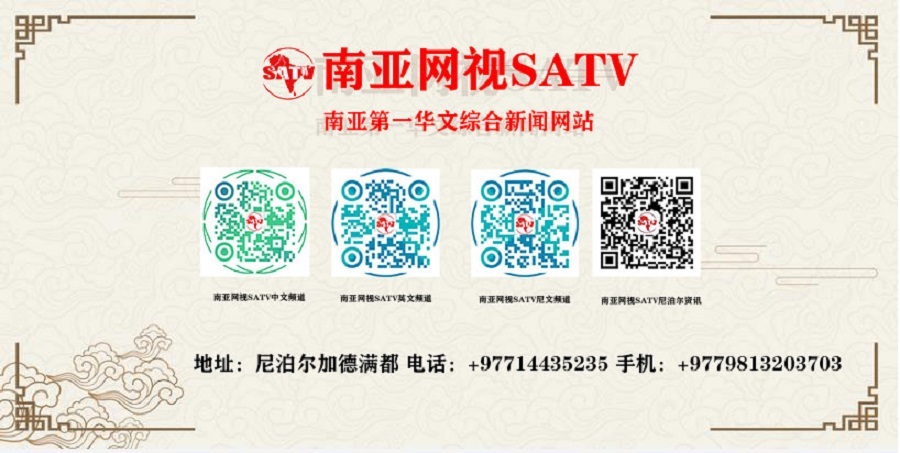
Motor vehicle assembly plants have started attracting foreign and domestic investment after the government announced a 50 percent tax waiver on components.
As of June 5 of the current fiscal year, Nepal had received foreign direct investment commitments worth Rs1.15 billion from China to set up electric two-wheeler and three-wheeler factories, the Department of Industry revealed.
The investment pledges are for small and medium-scale industrial firms which will create 479 jobs, according to the department's statistics.
In March 2020, the government approved a Rs10.54 billion investment by South Korean automaker Motrex to set up a world-class manufacturing and assembling facility in the country.
The company intends to manufacture 50,000 passenger and commercial vehicles annually. It will turn out 34,000 passenger vehicles, 15,000 SUVs and 1,000 commercial pickups. Production will start with 5,820 units in the first year of operation.
The company will make 20 percent value addition while manufacturing vehicles in Nepal and provide most of the jobs to locals, according to the company proposal.
Besides foreign investors, domestic investors too have been showing an interest in the motor vehicle assembly industry.
According to the Department of Customs, six vehicle assembly companies with a combined capital of Rs6.83 billion have been registered with the Industry Department in the current fiscal year. These factories will generate 1,083 jobs.
CG Automotive Industry with a capital of Rs1.31 billion proposes to assemble 10,000 two-wheelers, 3,000 three-wheelers and 10,000 four-wheelers annually. The company will employ 113 persons.
MAW Auto is spending Rs1.51 billion on its plant which will assemble 31,000 motorcycles and 19,000 scooters annually, and provide jobs to 144 persons.
SG Autocraft with a total capital of Rs3 billion plans to produce 2,100 electric two-wheelers, 600 electric four-wheelers (cars/SUVs), 1,200 electric three-wheelers and 120 e-buses annually.
The firm will also assemble internal combustion engines for two-wheelers, three-wheelers, four-wheelers and six-wheelers. It plans to turn out 10,500; 1,500; 600; and 750 petrol-powered engines, respectively, per year. The company will employ 431 people.
E Bolt Mobility with a capital of Rs243 million will be producing 15,000 electric vehicles annually and provide jobs to 100 people.
Global Automobile will spend Rs464.59 million on its factory which will assemble 30,000 motorcycles and scooters and 5,000 auto rickshaws annually, and create 150 jobs.
Dugar Auto Clinic has also entered the assembling industry and plans to bring out 24,000 two-wheelers and 4,000 three-wheelers annually. It has a capital of Rs300 million and will provide employment to 145 persons.
STC Energy Industries will be producing 600,000 units of various types of lead-acid batteries with an investment of Rs530 million. The firm will create 200 jobs.
The government's revised budget for the current fiscal year has provisioned a 50 percent tax waiver on parts used by the two-wheeler assembling industry, up from the previous 25 percent.

Post File Photo
The budget for the fiscal year 2022-23 has provisioned to exempt 50 percent excise duty and 25 percent import duty on spare parts or raw materials required for vehicle production, if a four-wheeler manufacturing or assembling industry is established in Nepal.
The budget for the upcoming fiscal year has provisioned to levy only 1 percent customs duty on raw materials or spare parts used by plants manufacturing electric rickshaws, motorcycles or scooters.
Golchha Group and Jagadamba Group have been assembling Bajaj and TVS motorcycles in Nepal.
Dhurba Thapa, president of the Nepal Automobile Dealers’ Association, said that many countries started out as motor vehicle assemblers before becoming manufacturers.
Thapa said that stability in government policy was important or the capital invested by the investors could be put at risk.
“Assembling vehicles is not a productive sector. In fact, it is policy corruption,” said Pawan Kumar Golyan, president of the Confederation of Banks and Financial Institutions, speaking at a recent function.
"Importing goods largely in foreign currency and making a small value addition does not contribute to the national economy and employment generation," said Golyan who also chairs NMB Bank and Golyan Group. There should be value addition of 30 percent.
“The people operating such factories are engaging in policy corruption,” Golyan told the Post. “We need a labour-intensive industry,” he said.
“This benefits certain traders and not consumers and the nation,” Golyan said. "Investments should not be made in an industry like this that is made from policy corruption."
Golyan says the massive import and re-export of raw edible oil is another example of policy corruption.
“Traders are coming into the ‘productive sector’ using a loophole and corrupting it.”
The power and influence of certain business houses at the policy-making level have diverted investments to such low value-added productive sectors instead of the real productive sector, said an insider.
Thapa said that the tax waiver on two-wheeler components had not resulted in a price difference between locally assembled and imported vehicles.
“There is no price difference between locally assembled and imported vehicles because of high operating costs in the initial years of the assembly plant and low production volume, but this will change and assembled vehicles will become cheaper in the coming days,” he said.
"The provision in the budget for the upcoming fiscal year will allow the consumer to experience the price difference," Thapa said.
“Investing in assembly plants is not a priority area for banks as there is no comparative advantage,” said Upendra Poudyal, chairman of Nabil Bank. "Tourism, hydropower and some areas in the service sector have a comparative advantage."
Poudyal said that investments should be made in the real economy. “Assembling vehicles cannot be put in the real economy practically,” he said. "Even if there is 20 percent value addition, it is good for the economy in some way."













